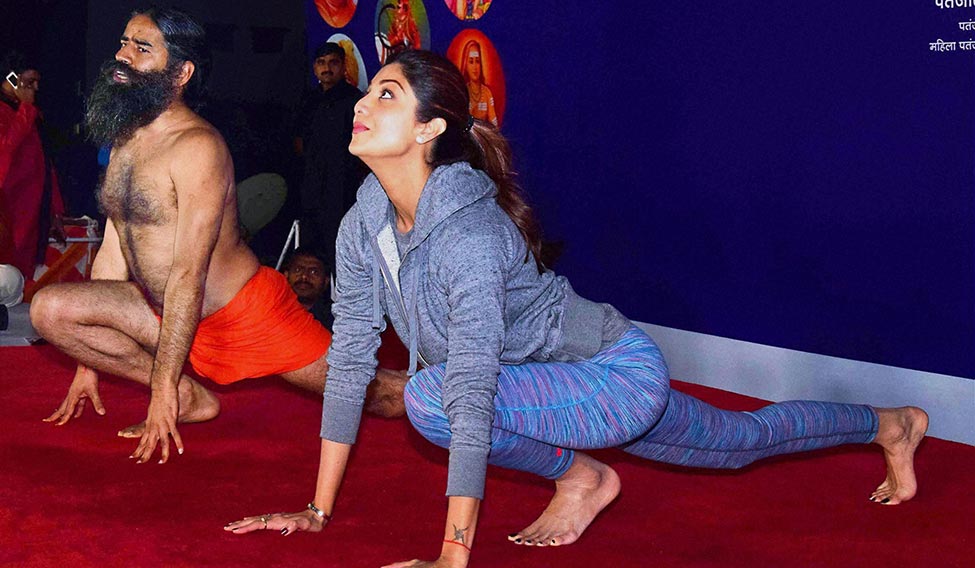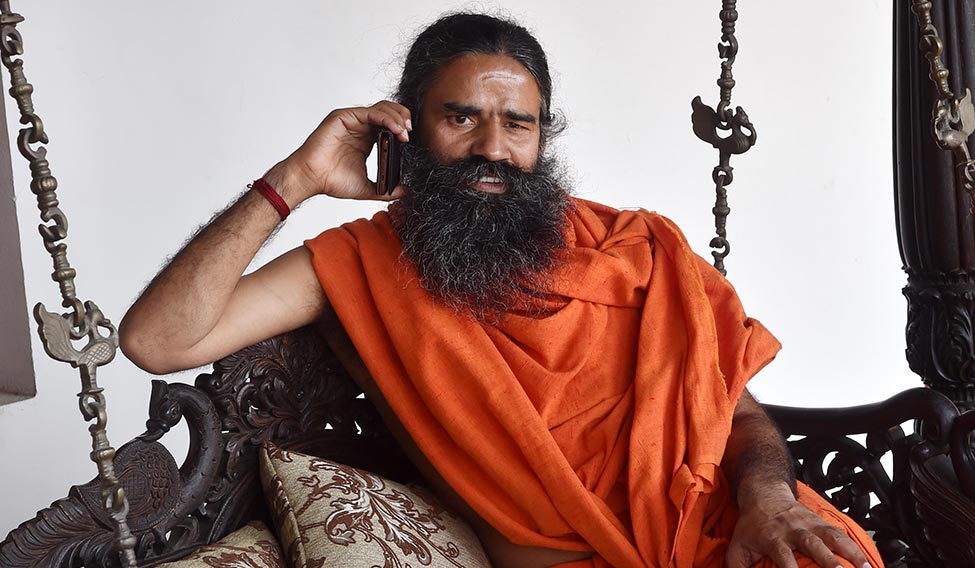From outside, Baba Ramdev’s house Sant Kutir, in Haridwar, looks like a fortress. The huge black gate, Central Reserve Police Force guards and tight security checks add to the aura. As you enter the premises, you see a sprawling garden with cottages on one side and a house, with a porch, on the other. Move a little closer, and the setting seems more relaxed. The garden is spartan, as are the cottages. The house—a few hundred metres away from a dusty highway—seems like an island of calm, apt for an ascetic. The yoga celebrity, however, allows himself one piece of opulence—a white Range Rover.
Ramdev has just returned from Delhi and looks a bit tired. However, as we approach, he springs up from a carved wooden swing and greets us with a “namaste”. He has microphones tucked into his saffron garb, and the sun shines on his forehead, making it glisten. The setting, with ample warmth, is perfect for a cold winter afternoon.
The Patanjali brand—a homegrown success—has been the talk of the town and Ramdev has never shied away from challenging multinational companies such as Hindustan Unilever, Procter & Gamble and Nestle. “More than five crore people have been rendered jobless by MNCs,” he says. Ramdev’s dream is to kick out these MNCs from India and he seems to have the business acumen to do so. After all, one does not expect to hear about a “five-year plan” from a yoga guru.
Patanjali’s latest strategy is to become an “umbrella brand” for small businesses. In sectors such as dairy, textiles, herbal products, fruits and organic farming, the production will be done by small artisans and farmers, and Patanjali will help them reach the market by creating sub-brands for each segment. Ramdev says the brand would give direct employment to five lakh people in the next five years and indirect employment to five crore.
“Patanjali will promote a lot of swadeshi brands under it,” says Ramdev. “The quality checks will be with us. We will be Swadeshi Udyog Sangh (Swadeshi industry association).”
So, the next time you visit a crockery shop, don’t be surprised if you find Patanjali earthenware sharing space with fine bone china. Or even Patanjali leather bags taking away focus from their Chinese counterparts.
Patanjali’s turnover for this year is expected to be 010,000 crore, which is impressive for a brand that is less than a decade old. Most of the money comes from its FMCG sales and the rest from donations. And, though the company is expanding aggressively, not all of the money goes into business. “We have spent money on schools, colleges, goshalas, gramodyog, a natural relief centre and a relief centre for the disabled and poor,” he says. “Patanjali’s profit is being utilised for these purposes.”
Given his opposition to MNCs, what happens when he bumps into an Indian CEO of an MNC at a conference? “I would tell them, ‘You have worked for long enough as slaves under these MNCs. Now come back to swadeshi’,” he says. Patanjali has already hired some people from top MNCs, he says with a laugh.
Though Ramdev opposes MNCs, he wants Patanjali to become an Indian MNC. To this end, the company has set up a food park in Nepal. “We will start with developing countries and then move on to Europe, the US and the UK,” he says. “We will bring back wealth from those who have plundered us.”
 Baba Ramdev enjoys quite a rapport with celebrities, including actor Shilpa Shetty (in pic) | PTI
Baba Ramdev enjoys quite a rapport with celebrities, including actor Shilpa Shetty (in pic) | PTI
But, won’t he face the same protectionist stance in these countries? “These companies do not work for their own countries,” he says. “We will also do some charity work wherever we go.”
Despite an empire growing around him, Ramdev continues to live ascetically. He wakes up before 4am and works for 14 hours every day. His mornings start with aloe vera and amla juice with lukewarm water. Then, three hours of yoga followed by breakfast, which is herbal or fruit juice. So, does he don the hat of CEO after that? “I research on Patanjali products, do branding, check out raw materials and see the product development happen,” he says with a chuckle. “A lot of time goes into all of this.”
Lunch is a simple fare of roti—made of bajra, corn or ragi—and green leafy vegetables. Work goes on till evening, after which he snacks on fruits and does another session of yoga. “I do not need rest or relaxation because I enjoy what I do,” he says. “Some people listen to music or watch television to de-stress. I just move on to another task.”
As a passionate writer, Ramdev says the current clash of ideologies is destructive and that, for him, everyone is divine. He loves writing about brotherhood, coexistence and oneness, and is helping an author put together his autobiography, which is slated to release by 2018.
His other pastimes include meeting people, doing research, singing patriotic songs and playing sports. Recently, a picture of him playing football in Delhi went viral.
During the conversation, Ramdev excitedly asks about the feedback on his latest video with actor Ranveer Singh. In fact, he enjoys quite a rapport with celebrities, including actor Amitabh Bachchan, who learnt yoga from him. “Aamir [Khan] and Salman [Khan] also like me,” he says. “Shilpa Shetty finds me inspirational and considers me her guru.” Actors Dharmendra and Hema Malini are also huge fans, and apparently do kapalbhati and anulom vilom (breathing techniques) for 30 minutes daily.
The conversation steers towards demonetisation; Ramdev says it was he who started the black money discourse a few years ago. He says that though demonetisation was a bold move, there are procedural problems. “How much can Modiji alone do? Bankers, in nexus with corrupt people, have hoarded money,” he says. The Rs 2,000 note should be scrapped, he says, or demonetisation will not meet its intended objective. He also blames the banks for charging excessively on point-of-sale transactions. “This is dacoity in the name of digitisation,” he says. “Banks are charging 1.5 to 2 per cent. On some of our FMCG products, the margins are only that much.”







